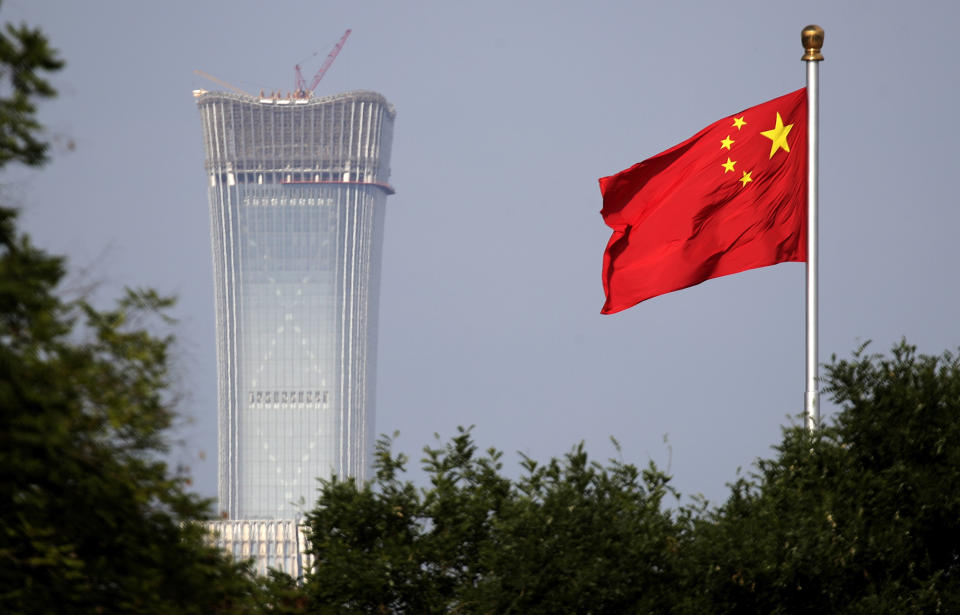How China is gearing up for a trade war with the US
The U.S. and China are about to reach a dangerous phase in their tit-for-tat trade dispute on Friday, July 6, when each country’s tariffs on $34 billion in goods will go into effect.
China is gearing up, socially and economically, to handle a full-blown trade war.
Maintaining social stability
With an acute focus on social stability, the Chinese government aims to contain any negative impact a trade war may have on its highly controlled society. During a meeting within China’s National Public Security system earlier this week, officials at the Ministry of Public Security alerted the country’s police bureaus of the looming trade war between China and the U.S. and its risk to social stability, Yahoo Finance learned. (These public security meetings take place periodically and are called when top officials feel a need to address concerns over China’s social stability.)

Thus, public security agencies in China plan to prohibit protests related to trade since people who may be economically hurt by the trade war could take to the streets to vent their anger and frustration. The Ministry of Public Security will also work on preventing people from attacking U.S. embassies in China as nationalist sentiment rises.
Preserving social stability remains a main goal of the Chinese government, which has always identified risks in advance. The country has tight control over group protests — including strikes, petitions, rallies and marches. But in a rare move in 2012, the government allowed some anti-Japanese demonstrations over territory disputes. Thousands of people hit the streets and rallies turned into violent incidents, including the burning of Japanese cars.
The Chinese government doesn’t want what happened in 2012 to occur again, as it carefully positions itself in a changing global trade system while dealing with sluggish economic growth. Tensions are already heightened in China due to disparities in the distribution of wealth. A further slowdown in the economy could threaten the Chinese state’s stability, which is based on the Communist Party’s legitimacy and control.
With pervasive internet censorship and dominant narratives from state-owned media, a vast majority of Chinese agree with President Xi Jinping’s view that America is using tariffs and investment restrictions to hold China back, according to Gary Hufbauer, a trade expert at the Peterson Institute for International Economics.
“Chinese people are willing to do battle, and accept the economic hardships that will come from an all-out trade war,” Hufbauer said in an email to Yahoo Finance. “By contrast, American farmers who lose sales and American workers who lose jobs will not see the economic hardship as their patriotic duty. They will complain bitterly and forcefully.”
Investors are wary
China’s stock market has been under a lot of pressure, as the benchmark Shanghai Composite entered bear market territory Tuesday, dropping more than 20% from its recent high in January. China’s yuan also suffered from some volatility, hitting its lowest point in six months last week.
People’s Bank of China Governor Yi Gang addressed the panic selling, and in late June appealed to the country’s vast number of individual investors to “not lose confidence.”
The Chinese government, the guiding hand in the world’s second-largest economy, said it would protect the interest of both Chinese and foreign-owned companies in China. “We’ll keep evaluating the potential impact on companies and try to help alleviate the pain,“ said Gao Feng, China’s Commerce Ministry spokesman, at a press conference in Beijing on Thursday.
China has repeatedly said it will not “fire the first shot” in a trade war with the U.S. State-owned media also emphasized that China is being forced to defend itself.
Meanwhile, China is conveying confidence and optimism to its people. “China’s economy has high risk bearing capacity. The socialist market economy has obvious institutional advantages in dealing with various difficulties and risks,” said Guo Shuqing, the country’s top banking and insurance regulator, in an interview published on the website of China Banking Regulatory Commission on Thursday. “But as long as we uphold the party’s leadership and persist in reform and opening up, we can overcome various challenges.”
Some believe China has reasons to be optimistic. Hufbauer expects the political fallout in China from an all-out U.S.-China trade war to be far less than in the U.S., even though the overall economic hardship in China will be greater. “Beijing will be in a stronger position than Washington to endure the pain,” said Hufbauer.
Krystal Hu covers technology and economy for Yahoo Finance. Follow her on Twitter.
Read more:
Why the rest of 2018 looks good for investors
Why the $375 billion US-China trade deficit can be totally misleading
Inside Amazon’s little-known graphic T-shirt-making business
Foxconn executive: Make products in the U.S. and sell them to China

 Yahoo Lifestyle
Yahoo Lifestyle 


